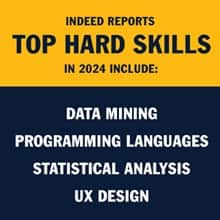The Difference Between Bachelor of Arts and Bachelor of Science

Know before you read
At SNHU, we want to make sure you have the information you need to make decisions about your education and your future—no matter where you choose to go to school. That's why our informational articles may reference careers for which we do not offer academic programs, along with salary data for those careers. Cited projections do not guarantee actual salary or job growth.
Earning an undergraduate degree is an important decision to make, one that can change the path of your career — even your life. So, as you research programs you may want to pursue, it’s good to understand some of the basics, like why or how a Bachelor of Arts (BA) differs from a Bachelor of Science (BS) degree.
The difference between BA and BS degrees ultimately comes down to the program of study. Typically, each undergraduate program falls under one of these two categories.
If you’re passionate about more abstract or theoretical topics that require critical thinking, like English literature or political science, you'd likely enroll in a Bachelor of Arts program.
If you prefer a narrower focus in your study, as well as gaining technical or scientific knowledge to succeed in fields like data analytics or health information management, then you'll probably earn your Bachelor of Science.
What is a BA Degree?
A Bachelor of Arts degree — also known as a BA degree — encompasses a wide variety of topics with an emphasis on general education. This is ideal for students who don’t want to confine themselves to one topic of study and would prefer to have a more well-rounded education.
While many students who start a Bachelor of Arts degree may choose the program based on their career aspirations, a BA also gives you more wiggle room if you don’t have something specific in mind. For example, a history major can find roles in journalism or politics. A creative writing student can see success in marketing. And a psychology graduate may want to dive into research positions.

After earning a BA in Creative Writing and English at Southern New Hampshire University (SNHU), Lawrence Michael Mazza II '22 was interested in working in multiple fields. The skills and knowledge he acquired in his degree positioned him to pursue varying roles.
"I started applying for jobs in both teaching and editing," he said. In the end, he opted for a job teaching middle-school English. (Note: Requirements to become a teacher may vary by state.)

In recent years, the knowledge gained from BA degrees has been a hot commodity: "Technical proficiency may get workers in the door, but soft skills foster the flexibility and agility to keep them in the building as technology and work evolve. Workers well-equipped with soft skills have greater career durability and longevity," said Johnny C. Taylor, Jr., SHRM-SCP in an article for the Society for Human Resource Management (SHRM).
Although different industries look for different skills, The World Economic Forum (WEF) said that attention to detail, self-awareness and leadership are some of the most desired soft skills — and they're all naturally strengthened throughout the BA curriculum (WEF PDF Source).
Coursework throughout a BA program is typically broad and often provides you with more general electives that allow you to explore additional subject areas and disciplines.
What Jobs Can You Get With a BA Degree?

According to Maryann Serrilla, an admission counselor at SNHU, someone with a BA degree might pursue a career as a:
Marketing Coordinator
Marketing coordinators help develop a company's brand strategy and ensure marketing efforts uphold that strategy. They might prepare marketing activity reports, organize market research and competitor analyses and communicate marketing objectives and timelines to other teams, according to LinkedIn Talent Solutions.
A marketing coordinator might go on to work as a marketing manager, whose role is to assess potential markets and demand for a company's products and services, said the U.S. Bureau of Labor Statistics (BLS). Marketing managers work with various teams within an organization to help maximize profit and customer satisfaction.
In 2023, marketing managers earned an average salary of $156,580, and BLS estimates an 8% job growth between 2023 and 2033.*
Public Relations Specialist
Public relations specialists handle communication between an individual, group or company and the public, according to BLS. They write press releases, respond to media inquiries and ensure that their client's stories get media coverage.
In 2023, public relations specialists earned an average salary of $66,750, and BLS predicts a 6% job growth through 2033.*
Social Worker
To become a social worker, the first step is usually earning a bachelor's degree, according to BLS. Next, you would go on to earn a master's degree from a program accredited by the Council on Social Work Education and obtain licensure. (Note: Social work degrees are currently not offered at SNHU.) If you want to become a licensed social worker, keep in mind that the requirements for licensure vary by state.
Social workers help people cope with various life challenges, such as adoption, illness or substance abuse, said BLS. Licensed clinical social workers diagnose and treat mental, behavioral and emotional disorders, as well as providing individual and group therapy.
In 2023, social workers earned an average salary of $58,380, with BLS predicting a 7% job growth through 2033.*
Most Popular BA Degrees
Some popular programs of study that usually fall under a Bachelor of Arts designation include:
- Bachelor's in communication
- Bachelor's in creative writing
- Bachelor's in history
- Bachelor's in psychology
- Bachelor's in sociology
While there are certainly outliers, many degrees that focus on the liberal arts, humanities or social sciences may be considered Bachelor of Arts degrees.
Find Your Program
Get Technical With a BS Degree
If BAs focus on soft skills, then Bachelor of Science — or BS — degrees dig deep into the hard skills. Indeed reports that some of the most in-demand hard skills in 2024 were:
- Data mining
- Programming languages
- Statistical analysis
- UX design

Students in relevant degree programs are trained in these skills that are highly sought-after by employers.
The curriculum for a Bachelor of Science degree may be more rigid: Because employers have an expectation of what you’ll know as you enter a job, your program could require more specific courses — meaning less space for free electives. You could still have the opportunity to complement your degree with poetry or anthropology courses; you’ll just need to be more strategic about your course choices each term.
What Jobs Can You Get With a BS Degree?
Depending on what BS you pursue, Serrilla said this type of degree could help you start a career as a:
Data Analyst
If you want to become a data analyst, you generally need a bachelor's degree in math, computer science or a relevant field. Data analysts gather and assess data and create charts, maps or other graphics to present their findings, said BLS. A data analyst might focus on a certain field, such as machine learning, academics or marketing.
Data analysts earned an average salary of $108,020 in 2023, and BLS predicts a job growth of 36% through 2033.*
Financial Analyst
To become a financial analyst, you typically need a bachelor's degree, according to BLS. Financial analysts help individuals and companies to gain profit by analyzing how stocks, bonds and other investments are performing.
In 2023, financial analysts earned an average salary of $99,890, with BLS predicting a 9% job growth through 2033.*
Software Developer
Software developers analyze user needs and design software to fit those needs, said BLS. They might also recommend software upgrades for customers and provide testing and maintenance to ensure a program's continued functionality.
In 2023, software developers earned an average salary of $130,160, according to BLS, with a predicted job growth of 17% through 2033.*
Most Popular BS Degrees
Students enrolled in BS programs often have a particular career path in mind, as their degrees set them up to have specific skill sets.
Some popular Bachelor of Science degrees include:
- Bachelor's in accounting
- Bachelor's in business administration
- Bachelor's in criminal justice
- Bachelor's in nursing
- Bachelor's in public health
If you're interested in pursuing a career in business, technology and healthcare, there's a good chance the degree you earn will be considered a Bachelor of Science.
Is a BA or BS Better?

There’s no right or wrong bachelor’s degree. What’s most important is deciding on a major that aligns with you personally and professionally — something you’ll enjoy studying and that can also bring you fulfillment in your career.
"The choice between a BA and a BS ultimately depends on your personal interests, strengths and career goals," Serrilla said.
If you're still not sure which is best for you, Serrilla said that a BA can offer more flexibility, because a BS degree usually focuses on certain technical or scientific subjects.
Whichever path you choose will be the right one for you. Because with either a BA or a BS, you’ll earn a credential that could change your world.
Beyond equipping you with new knowledge, skills and confidence, a BA or a BS degree can help you increase your earning potential. In 2023, the median weekly earnings were $1,493 with a bachelor's degree and $899 with just a high school diploma, BLS reported.*
Bachelor's degree holders also faced a lower unemployment rate that year, BLS said. Those with a bachelor's degree saw 2.2% unemployment rates in 2023, according to BLS, while those with just a high school diploma were 3.9%.*

Beyond the Bachelor's
Finishing your bachelor's degree may help you unlock new career opportunities or give you the credential needed to advance in your current role and toward your personal and professional goals.
Some schools, such as SNHU, can offer you professional support. Whether you're working on your resume or preparing for a job interview, you can take advantage of expert career advisors and an expansive alumni network as a student and well beyond graduation.
If you decide to take your education a step further, you might consider the benefits of advancing with a master's degree.
The median weekly earnings were $1,737 in 2023 for people with a master's degree, BLS reported, which is 16% more than the median bachelor's degree earnings.*
The potential financial benefits and increased job security are just two perks of advancing from a Bachelor of Arts or a Bachelor of Science to a Master of Arts (MA) or a Master of Science (MS). The additional credential can also help you focus on a subject that interests you and show employers you put in the time and effort to gain expertise.
A degree can change your life. Find the SNHU online bachelor's degree that can best help you meet your goals.
Deidre Ashe was 9 years old when she launched her professional writing career. While spending a day at work with her dad, she penned her first book, illustrated it and sent it off to a publishing company — after finding the address on the copyright page of one of her paperbacks. While the story never made it to the shelves of libraries, the editors wrote back, encouraging her to continue pursuing her writing passion. (Yes, she still has that letter.)
After earning a bachelor’s in journalism, Ashe spent a decade working in the media industry. She then transitioned into marketing, later getting her MA in Communication from Southern New Hampshire University in 2018. Connect with her on LinkedIn.
Explore more content like this article

Associate Degree vs. Bachelor's Degree: What's the Difference?

How to Get a Scholarship (And Why It Matters If You Do)

What is Tuition Reimbursement? The Often-Overlooked Employee Benefit
About Southern New Hampshire University

SNHU is a nonprofit, accredited university with a mission to make high-quality education more accessible and affordable for everyone.
Founded in 1932, and online since 1995, we’ve helped countless students reach their goals with flexible, career-focused programs. Our 300-acre campus in Manchester, NH is home to over 3,000 students, and we serve over 135,000 students online. Visit our about SNHU page to learn more about our mission, accreditations, leadership team, national recognitions and awards.

